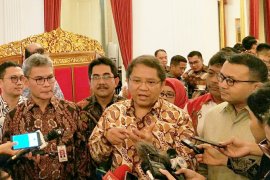Some 17 early-stage startups from various sectors, ranging from supply chain, small and medium enterprises (SMEs) mobilizer, health, property, consumption, finance, and sports to immersive technology participated in Startup Studio Indonesia.
The program provides access facility for early-stage startups to develop their potential businesses, Informatics Application Director General at the Ministry Semuel A. Pangerapan noted during the program's opening streamed online on Thursday.
The 17 startups participating in the sixth batch of SSI comprise Amoda, Assemblr, Ayo Indonesia, Baskit, DEUS, Lakuliner, Inventing, Looyal Indonesia, Medicall, Oneklinik, Pajak.io, Payable, RASA, Rooma, Tookban, SMEs Pack and Tweak.
The founders of these startups are being prepared to undergo training from 80 active practitioners in the digital ecosystem for a period of four months.
Moreover, a one-on-one training will be conducted that helps startup founders in the early stage to be able to develop their products based on market demands, or what is known as Product-Market Fit.
With a training curriculum that is continually updated, Pangerapan is optimistic of Indonesia being capable of developing competitive startups.
"We believe that Startup Studio Indonesia will open a new network to develop startups faster and find accurate and credible figures to be able to consult with ongoing challenges," he remarked.
The presence of Startup Studio Indonesia's sixth batch is also expected to make the digital transformation acceleration program a success and provide positive contribution to Indonesia's digital economy growth.
According to research from Google, Temasek, as well as Bain & Co in 2022, the value of Indonesia's digital economy had reached US$77 billion.
If it is supported with the massive growth of digital ecosystem actors, Indonesia's digital economy is estimated to be able to reach US$220-$360 billion in 2030.
"To actualize this project, we need reliable digital economy players that can compete and develop Indonesia's digital economy. This is what we expect from early-stage startups in Indonesia," Pangerapan affirmed.
Until 2024, the ministry is aiming to be able to produce 150 startups that grow in terms of users, income, workforce absorption, and funding.
Related news: Startups rapidly emerging from Central Japan - local entrepreneurs explain why
Related news: Startups must be watchful of existent issues: Ministry
Translator: Livia K, Fadhli Ruhman
Editor: Rahmad Nasution
Copyright © ANTARA 2023












